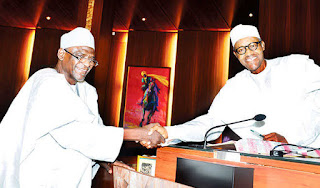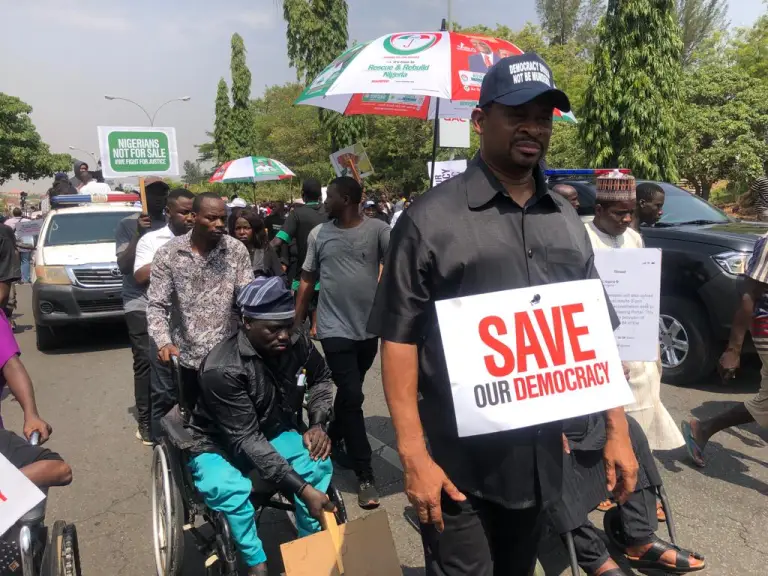(Adamu Adamu is currently the Education Minister)
….With its 129 universities, 100-odd polytech-nics and 85 colleges of education and a very I-don’t-care attitude to higher education, Nigeria spends less than 1 per cent of its Gross National Income [0.85% to be precise]; while four of its smaller English-speaking African compatriot-states spend multiples of that: Ghana [2.85%], Egypt [3.9%], Zimbabwe [5.4%] and South Africa [7%]. And while the percentage of education expenditure to total national expenditure in Nigeria is a paltry 8.4%, South Africa spends 20%, Morocco spends 26.4%, Botswana 25.6% and French-speaking Guinea and Cote d’Ivoire spend 25.6% and 21.5% respectively.
In spite of this, how Nigeria still dreams of joining the big league remains the biggest mystery. In what must now be seen by some as a joke, especially in view of its attitude to education, Nigeria has been saying it wants to be among the world’s top 20 economies by 2020. But after laughing at this joke, we should remind policymakers that those nations that are in, or truly wish and look poised to join, the ranks of those top economies have a particular attitude to education that Nigeria doesn’t seem to share.
While Nigerians are always very good at mimicking educated global discourse as if they were the ones who invented it—corporate governance, information and communication technology, ICT, globalisation, climate change, ozone layer and the knowledge economy—their government has in fact been busy laying solid foundations for an ignorance economy.
And a comparison with China and India, the two countries of the BRIC whose rank Nigeria wishes to join, will quickly put Nigeria in its place. The Nigerian university system is, indeed, paralysed by a strike caused by government refusal to make the kind of investment the BRIC’s have been making.
Within a decade and a half, for instance, China invested in a massive expansion of its education sector, nearly tripling the share of GDP devoted to it, such that the number of higher-education institutions grew and more than doubled from 1,022 to 2,263 within a single decade; and within the same period, it was able to increase the population of its bachelor’s degree students from 3 million to 12 million. At the moment, it has more than 20 million students studying in those institutions of higher learning. This is typically representative of what was happening in almost all of the BRIC’s, in which the total population of undergraduate students increased from about 19 million in 2000 to more than 40 million students in 2010.
And because China really means to develop its society and economy, the total number of its computer science and engineering graduates from its elite universities is more than the total number of such graduates from the United States. That is why in the race where it matters, China has over 1,200,000 IT professionals and is adding 400,000 technical graduates each year. China ranks first in the world, followed by India and the US. IT professionals are so pitifully few in Nigeria; and, what’s more, the country is so inefficient, it doesn’t keep this kind of record.
The effect of China’s investment in education is already paying off. According to a report by the Organization for Economic Cooperation and Development (OECD), which has tested high-school students since 2000, students from Shanghai’s schools outperformed those from 65 countries. They were followed by students from Korea, Finland, Hong Kong and Canada in that order. In the same test, students from the US ranked number 24.
And at the lower end, India has 373 univer-sities with 16,000 affiliated degree-awarding colleges functioning under them; and. Like China, the emphasis in the tertiary level of education is on science and technology. India has some 3495 degree-granting colleges with an annual student intake capacity of over 1.76 million with actual enrolment crossing 1.2 million in engineering alone. Total enrolment in science, medicine, agriculture and engineering crossed the 6.5 million limit in 2010, as expenditure on education grosses 4.1 per cent of GDP and surpasses the 12.7 per cent mark of total government expenditure.
In essence, the struggle by ASUU is to force the Nigerian government make this type of investment. Obviously, it takes concern to understand the nature of what is going on, and it takes real public spiritedness to want to do something about it; and it takes uncommon patriotism to then go ahead and do it, especially for lecturers who face a barrage of insults, the prospects of possible job loss or pay withheld. This nation owes a debt of gratitude to ASUU and the strike should not be called off until the government accepts to do—and does—what is required. This is why ASUU is always on strike.
The goal for ending the strike shouldn’t be to save parents anxiety or to take pity on students or to save lecturers’ jobs or to graduate students: it is to save the university system so that it becomes what it is supposed to be—a system for producing a culturally literate society, and for generating and harnessing ideas and knowledge, initiating and driving social and economic innovation, and ensuring national competitiveness on the global scene.
While for this to be possible, government should guarantee institutional autonomy for the university system, ASUU must ensure that campuses exercise this new power with utmost sense of responsibility and full accountability to all stakeholders. This is the only way for Nigeria to realise its full potential as a guarantor of prosperity for its people and for its natural leadership position on the African continent. Without education and the full development of the nation’s human capital, Nigeria will never be able to achieve any of its national goals, targets or plans even if every grain of sand in the country becomes a barrel of oil.
In this, ASUU should see itself as a van-guard – probably the only active one—dedicated to making the government begin to tread the path of responsible good governance in the administration of education in Nigeria—and not just on university campuses. Perhaps it should, in addition to what it already shoulders, take up the task of holding Nigeria responsible for, and forcing it to conform to, the six goals of Education for All by 2015 adopted thirteen years ago at the World Education Forum in Dakar.
These EFA goals, which are designed to improve learning opportunities for everyone, are: expanding and improving comprehensive early childhood care and education; ensuring universal access to and completion of free and compulsory primary education of good quality; improving learning opportunities for youth and adults; increasing adult literacy rates by fifty percent; achieving gender equality in primary and secondary education by 2015; and improving all aspects of the quality of education. We can go a year without graduation, especially of people who will not be employed.
Calling off the strike is no big deal nor yet a cause for celebration; it is not just its calling off that is important, what is more crucial is what eventually happens to the university system as a result. It is a hundred times better for this nation not to have graduates at all than to continue producing this army of half-baked [actually unbaked] graduates, 89 per cent of whom, according to the boss of the National Youth Service Corps, cannot communicate in English, a charge that is as bad and shameful as the failure itself is deplorable and unacceptable—that Nigeria is still talking of communicating in English.
BY ADAMU ADAMU (15TH NOV 2013)




